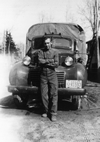9. The Fight of His Life
BUT SERAFINO HAD ALSO KEPT IN TOUCH with his former traveling companions, most of whom remained in Philadelphia. They sent him letters saying they had found “good jobs” in America. “Thanks for bringing us here,” wrote one of the guys. “We’ll help you find work if you want it,” promised another.
Serafino weighed his options. He was ready to start a family. He asked himself if he wanted to commit his children to a life of drudgery in the fields, knowing that all they’d do day in and day out, year after year for the rest of their lives, would be to toil in the fields for the sole purpose of eating, drinking, and maybe having children, who could then toil in the fields for the sole purpose of eating, drinking, and maybe having children, if they were lucky. “There has to be more to life than this!” he sighed. If he were ever to leave for America, now would be the time. He knew he was in for the fight of his life.
“Would you have any interest in going to America?” he delicately posed the question to Maria soon after their wedding.
“No!” she shook her formidable forehead. “No!” She had several compelling reasons. “What about your mother? What about my mother and father? What about your six brothers and sisters?” she raised six fingers. “What about my nine brothers and sisters?” she raised nine. “Each of them depends on us. How could we abandon them?”
“I could send them money for an electric flour mill,” he proposed. “Then they wouldn’t have to grind the flour by hand and foot.”
“They need us here more than they need us there,” she responded flatly, sweeping the floor around him as he sat in his chair. She reminded him of everything they had worked for. “What about your grapevines? What about my bridge?”
The reminders backfired. “We kill ourselves here just to grow enough to eat,” he protested. “We survive here only by working ourselves to death!”
“And America would be any better,” she scoffed. “The only thing America ever gave you was a dead father!” As soon as the words left her mouth, she knew she had hurt him. She halted her sweeping momentarily and looked down at the ground, uncertain of what to do next.
“Do you want our children to live the same life that we live?” Serafino asked her, his voice eerily calm as he began to speak, as if channeling the voice of his father from a childhood memory. But then, increasingly animated as he reverted back to his old self, Serafino recounted for Maria the details of the painstaking months that she had spent growing flax, then separating the stalks into threadlike fibers on a spinning wheel, then threading the fibers into fabric on a loom, and then meticulously cutting, stitching, and embroidering intricate designs all around the edges of the fabric. “All for the sake of making sheets!” he railed.
“Those sheets were for my dowry,” she reminded him, reclaiming her territory. “Have you forgotten already? Don’t you appreciate what you have?”
“Of course, I do,” he lowered his voice apologetically. “But you work too hard. Our children don’t have to live like this. We could bring our families to America. Anyone who wants to come could come. It would be their choice. Wouldn’t it be beautiful for them to have a choice?” he pressed his hands together in supplication.
“It’s beautiful here,” she stood by her ancestral home.
“But our children could become anything they want there.”
“Those are all promises,” she dismissed him with a vigorous sweep. “Those are all dreams.”
“They’re not just dreams!” he asserted. “I’ve seen it. I’ll prove it to you.” He studied her reaction. “I’ll find good work there. And then I’ll come back for you.”
She stopped in mid-sweep. She turned and shot him a look of astonishment.
He stood up from his chair and approached her. He reached for the broom and set it against a wall. He knelt down on one knee before her and held her right hand in both of his, as if clinging for dear life. “Just give me one chance!” he strained his neck to look up into her face.
She looked down into his dark eyes, so deferential yet unyielding, and exhaled. She knew that she couldn’t deny him the chance to at least try. She shuddered at the thought of ever leaving her home and family. But more frightening still, she knew how easy it would be to lose him. As she plumbed the depth of determination in his eyes, hers began to well with tears, causing her voice to crack: “How do I know the same thing won’t happen to you as happened to your father?”
He leapt to embrace her. He felt the warm tears from her cheeks anoint his brow. Holding her, he rolled his head gently onto her shoulder and spoke softly into her ear: “Maybe we could make his dreams come true.”
